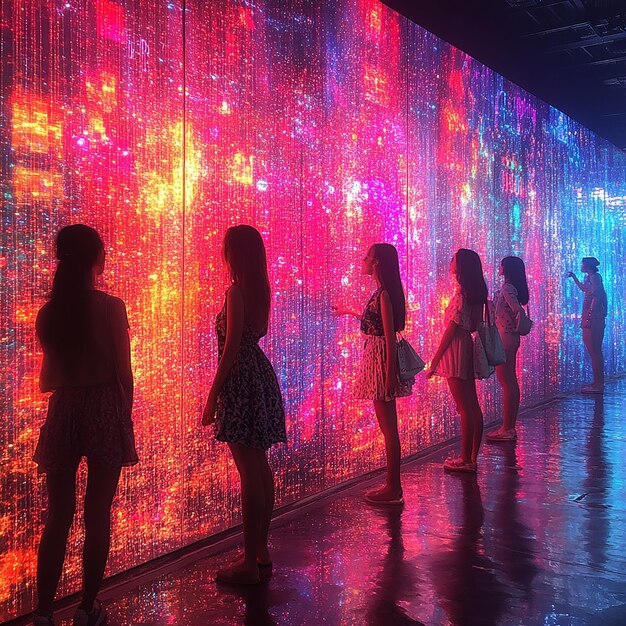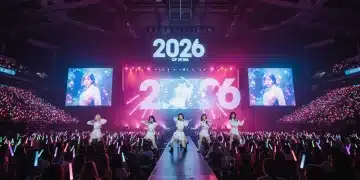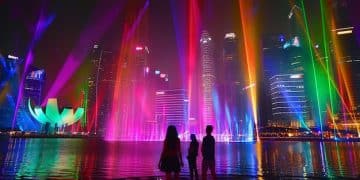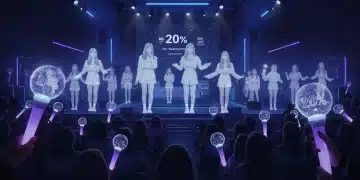The Future of K-Pop: 2025 Predictions for Idols & Music Trends

The Future of K-Pop: Predictions for the Next Generation of Idols and Music Trends in 2025 involves a dynamic shift towards greater global integration, technological advancements enhancing music production and fan engagement, and an increased emphasis on individual artistry and diverse musical influences within the genre.
K-Pop continues to evolve at a breathtaking pace, fueled by innovation and a global fanbase hungry for the next big thing. As we look ahead to 2025, what can we expect from the future of this dynamic genre? From emerging idol groups to groundbreaking music trends, the future of K-Pop: Predictions for the Next Generation of Idols and Music Trends in 2025 promises to be as exciting as ever.
The Rise of Globalized K-Pop
One of the most significant trends shaping the future of K-Pop is its increasing globalization. No longer confined to South Korea, K-Pop’s influence spans continents, attracting fans from diverse backgrounds and cultures. This global appeal is expected to intensify by 2025.
International Collaborations
Expect to see more collaborations between K-Pop artists and musicians from other parts of the world. These partnerships will blend distinct musical styles, creating hybrid sounds that appeal to a broader audience. Think of collaborations that seamlessly integrate K-Pop’s polished production with global rhythms and melodies.
Multilingual Idols
Agencies will continue to scout and train idols who are fluent in multiple languages. This linguistic diversity will enable groups to connect directly with fans in various regions, enhancing their international presence and fostering stronger relationships.
- More groups with multi-national members.
- Promotions and content tailored for specific regions.
- Increased use of English and other languages in songs.
The globalization of K-Pop is not just about reaching new markets; it’s about integrating diverse cultural elements into the genre itself. This fusion will lead to innovative music and performances that resonate with a global audience, solidifying K-Pop’s position as a leading force in the worldwide music industry.

Technological Advancements in Music Production
Technology plays a crucial role in the evolution of K-Pop, and by 2025, we can anticipate even more sophisticated tools and techniques being used in music production. These advancements will not only enhance the quality of the music but also streamline the creative process.
AI-Driven Music Creation
Artificial intelligence (AI) is already making inroads into music production, and its influence will only grow. AI can assist in composing melodies, generating harmonies, and even producing entire tracks. While it won’t replace human composers entirely, AI will serve as a powerful tool for augmenting creativity.
Virtual Reality (VR) and Augmented Reality (AR) Concerts
VR and AR technologies will revolutionize the concert experience. Fans will be able to attend virtual concerts that offer immersive and interactive experiences, regardless of their physical location. Imagine watching your favorite idol group perform in a virtual world, complete with stunning visuals and personalized interactions.
These technological advancements will reshape how K-Pop music is created, distributed, and experienced. From AI-driven production to immersive VR concerts, technology will continue to push the boundaries of what’s possible, offering new and exciting opportunities for both artists and fans.
The Evolution of Idol Groups
The structure and dynamics of idol groups are constantly evolving to meet the changing demands of the industry and the preferences of fans. By 2025, we can expect to see further innovations in how idol groups are formed and managed.
Project-Based Groups
Project-based groups, like those formed through survival shows, will become more common. These groups bring together talented individuals for specific projects, allowing for greater flexibility and experimentation. This approach enables agencies to test new combinations of artists and gauge audience interest before committing to long-term contracts.
Solo Artists with Collaborative Networks
While group dynamics remain central to K-Pop, there will be a growing emphasis on solo artists who collaborate with other musicians and producers. This model allows artists to explore their individual styles while still benefiting from the support and exposure of a larger network.
- More focus on individual members’ talents and skills.
- Opportunities for solo debuts and collaborations.
- Greater creative control for idols.
The evolution of idol groups reflects a broader trend towards greater flexibility and individual expression within the K-Pop industry. By embracing project-based groups and supporting solo endeavors, agencies can cater to a wider range of artistic visions and audience preferences.
Diversity in Musical Styles
K-Pop has always been a diverse genre, incorporating elements of pop, hip-hop, R&B, and electronic music. In the future, we can expect even greater experimentation and the integration of musical styles from around the world.
Incorporating Global Sounds
K-Pop artists will increasingly draw inspiration from global music trends, blending elements of Latin music, Afrobeat, and other genres into their songs. This cross-cultural pollination will result in a more diverse and globally appealing sound.
Emphasis on Originality
There will be a greater emphasis on originality and artistic expression. Idols will be encouraged to write their own songs, produce their own music, and develop their unique styles. This shift towards greater artistic control will foster more authentic and innovative music.

The future of K-Pop is a vibrant tapestry of diverse musical styles, blending familiar sounds with new and innovative elements. By embracing global influences and encouraging artistic originality, K-Pop will continue to evolve and captivate audiences worldwide.
The Power of Fan Engagement
Fan engagement is a cornerstone of K-Pop’s success, and its importance will only grow in the future. By 2025, fans will have even more opportunities to interact with their favorite idols and participate in the K-Pop experience.
Interactive Livestreams
Livestreaming platforms will offer more interactive features, allowing fans to directly influence performances, request songs, and participate in Q&A sessions. These real-time interactions will create a sense of intimacy and connection between idols and their fans.
Fan-Generated Content
Agencies will increasingly encourage and celebrate fan-generated content, such as fan art, covers, and remixes. This user-generated content will become an integral part of the K-Pop ecosystem, fostering a sense of community and creativity.
- Virtual fan meetings and concerts.
- Platforms for fans to create and share content.
- Rewards and recognition for active fan engagement.
The future of K-Pop is built on strong relationships between artists and their fans. By embracing interactive livestreams and celebrating fan-generated content, the industry will foster a vibrant and engaged community that drives the genre’s continued success.
Sustainability and Ethical Practices
As K-Pop’s global influence grows, so too will the demand for ethical and sustainable practices. Fans are increasingly concerned about issues like fair treatment of artists, environmental impact, and responsible consumption. By 2025, these concerns will drive significant changes in the industry.
Fair Contracts and Working Conditions
There will be greater scrutiny of contracts and working conditions for idols. Agencies will be expected to provide fair compensation, reasonable working hours, and support for mental health and well-being.
Environmental Responsibility
The K-Pop industry will adopt more environmentally friendly practices, such as reducing waste, using sustainable materials, and promoting eco-friendly merchandise. Concerts and events will also be designed to minimize their environmental impact.
The future of K-Pop is not just about music and entertainment; it’s about creating a sustainable and ethical industry that values its artists, its fans, and the planet. By embracing fair labor practices and environmental responsibility, K-Pop can set a positive example for the global music industry.
| Key Trend | Brief Description |
|---|---|
| 🌍 Global Integration | Increased collaborations and multilingual idols. |
| 🤖 Tech Advancements | AI in production, VR/AR concerts. |
| 🎤 Idol Evolution | Project-based groups and solo artist networks. |
| 🌱 Ethical Practices | Fair contracts and environmental responsibility. |
Frequently Asked Questions
▼
AI will assist in composing melodies and producing tracks, serving as a tool to augment creativity rather than replace human composers, enhancing music quality and streamlining the production process.
▼
VR and AR technologies will allow fans to attend immersive virtual concerts from anywhere, offering stunning visuals, personalized interactions, and a sense of presence that surpasses traditional online streaming.
▼
The industry is focusing on fair contracts for idols, environmentally friendly practices like using sustainable materials, and promoting eco-friendly merchandise to minimize its environmental impact and promote ethical standards.
▼
A project-based group is a temporary ensemble of talented individuals brought together for specific projects, offering flexibility and allowing agencies to test new artist combinations before committing to long-term contracts.
▼
Idols are using interactive livestreams for Q&A sessions, requesting songs, and creating a sense of intimacy and connection through real-time engagement, also celebrating fan-generated content like art, covers, and remixes.
Conclusion
As we look to the future, it’s clear that K-Pop will continue to evolve and innovate, driven by technology, globalization, and the unwavering passion of its fans. The next generation of idols and music trends promises to be as exciting and dynamic as ever, ensuring that K-Pop remains a global phenomenon for years to come.





